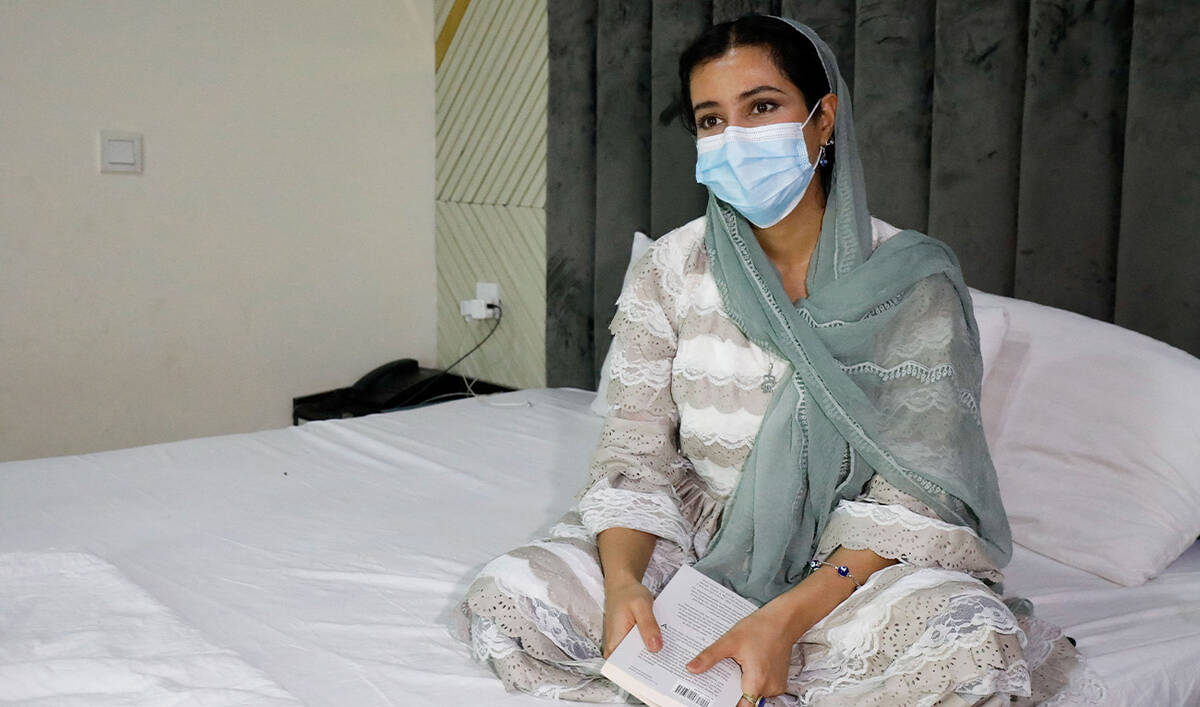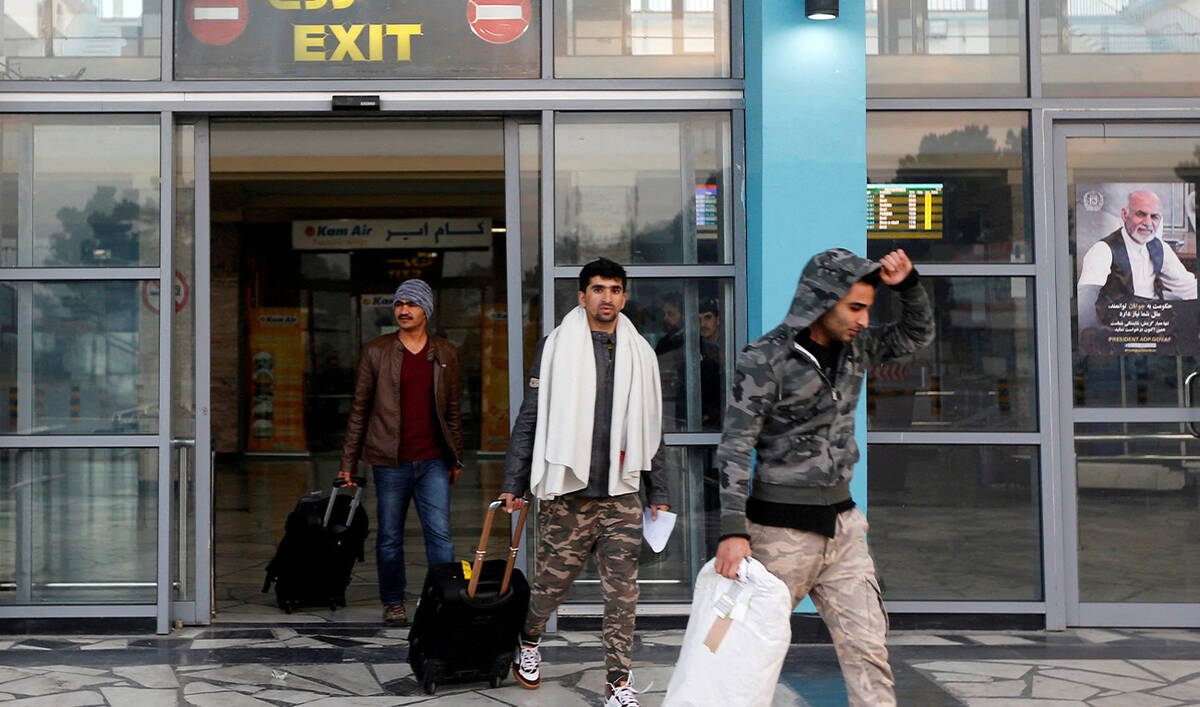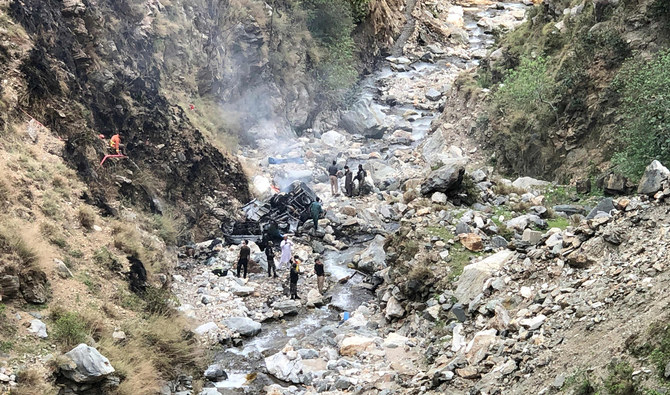ISLAMABAD: The Chairman of the China International Development Cooperation Agency (CIDCA), Luo Zhaohui, said Beijing will continue to work with Pakistan to fulfill commitments made under the framework of the China-Pakistan Economic Corridor and the Global Development Initiative, Pakistani state news agency APP reported on Friday.
Luo’s statement comes a month after a suicide bomber rammed a vehicle into a convoy of Chinese engineers working on a hydropower project at Dasu in the northwestern Khyber Pakhtunkhwa province, killing five Chinese nationals and their Pakistani driver.
The assault on Mar. 26 was the third major attack in little over a week on China’s interests in the South Asian nation, where Beijing has invested more than $65 billion in infrastructure projects as part of its wider Belt and Road initiative.
Chinese contractors suspended work on three hydropower projects in view of security concerns after the March attack, government officials told media last month.
“China is ready to work with Pakistan to implement the consensus reached by the leaders of the two countries, further, deepen strategic mutual trust, and promote practical cooperation in various fields within the framework of the China-Pakistan Economic Corridor and the Global Development Initiative,” APP quoted Luo as saying.
“In his meetings with friends from various sectors during a recent visit to Pakistan, he hoped that friends from all walks of life would continue to exert their influence, and offer advice and suggestions for the development of bilateral relations.”
During the meetings, according to APP, Lou thanked Pakistani officials for “their long-standing contributions to China-Pakistan friendly cooperation, emphasizing the increasingly significant strategic importance of accelerating comprehensive cooperation between China and Pakistan and leading regional development trends.”
The Pakistani side expressed condolences over the Dasu attack and “highly praised the enduring traditional friendship” between Pakistan and China and their cooperation in various fields.
“They added that Pakistan will continue to support the development of Pakistan-China relations, advance exchanges on state governance, and expand friendly exchanges between the two countries in various sectors, including between governments, parliaments, business communities, think tanks, youth, and civil society,” APP said.
The Mar. 26 bombing followed a Mar. 20 attack on a strategic port used by China in the southwestern province of Balochistan, where Beijing has poured billions of dollars into infrastructure projects, and a Mar. 25 assault on a naval air base, also in the southwest. Both attacks were claimed by the Baloch Liberation Army (BLA), the most prominent of several separatist groups in Balochistan.
Dasu, the site of a major dam, has been attacked in the past, with a bus blast in 2021 killing 13 people, nine Chinese among them, although no group claimed responsibility, like the Mar. 26 bombing.
Pakistan is home to twin insurgencies, one mounted by religiously-motivated militants and the other by ethnic separatists who seek secession, blaming the government’s inequitable division of natural resources in southwestern Balochistan province.
Chinese interests are under attack primarily by ethnic militants seeking to push Beijing out of mineral-rich Balochistan, but that area is far from the site of the Mar. 26 bombing.
China says will continue investments in Pakistan after deadly suicide bombing
https://arab.news/bmrad
China says will continue investments in Pakistan after deadly suicide bombing

- On Mar. 26, suicide bomber hit a convoy of Chinese engineers working on Dasu hydropower project
- Five Chinese nationals and their Pakistani driver were killed in the attack in northwestern Pakistan
Utility Stores employees vow resistance as government plans shutdown from July 10

- Workers’ union says closure will affect over 11,000 direct and 5,500 indirect employees
- A committee will discuss Voluntary Separation Scheme with union members on Friday
ISLAMABAD: The Utility Stores Corporation (USC) employees’ union on Thursday vowed to resist the government’s decision to shut down retail operations by July 10, saying it would fight for the rights of over 11,000 workers by initiating protests, sit-ins and legal action.
Established by the government in 1971, the corporation has a nationwide chain of retail outlets that provide essential commodities to the general public at prices lower than those in the open market.
The corporation took over 20 retail outlets at the beginning but now operates 6,000 stores across the country. The government allocated Rs65 billion ($229.7 million) to subsidize the products sold by the retail chain in the last fiscal year.
One of its spokespersons confirmed to Arab News the corporation’s public retail stores will be closed by July 10, adding that all operations will shut down by the end of the month.
“We have received instructions from the Ministry of Industries and Production to close down all the stores by July 10, shift remaining goods to warehouses and completely shut down operations by July 31, 2025,” Sajid Marwat, USC Public Relations Officer, said.
Meanwhile, Arif Shah, Secretary General of the All Pakistan Workers Alliance of Utility Stores, said the union will use all available avenues to protect the corporation and its employees.
“We will pursue both options, challenging the decision in court and staging on-ground protests including a sit-in at the [USC] headquarters,” he told Arab News.
“In total, around 17,000 people — including 11,500 direct employees of Utility Stores, 2,000 to 2,500 vendor staff and 3,000 franchise store workers from 1,000 to 1,200 outlets — will be affected by the closure,” Shah said, adding the authorities had already terminated around 4,100 employees.
He maintained the institution has remained in existence for 55 years, and shutting it down was not the government’s sole prerogative.
“If it is truly necessary to close this institution, the decision should be approved by parliament,” he said.
Shah noted that during emergencies and disasters, the corporation stood at the forefront to provide relief items and ensure food security due to its big presence all over the country.
He pointed out if the government was determined to shut it down, then at the very least, the employees should be given a fair and respectable voluntary separation scheme (VSS) package to help absorb the financial shock.
Asked about the possibility of offering such a proposal, USC spokesperson Marwat said a human resource committee would convene on Friday to review the issue in consultation with union representatives and the management.
“The union is not accepting the current terms as they are demanding compensation packages for everyone, including daily wage laborers and contractual staff, as all categories of workers are being affected,” he informed, adding that the government was considering a financial deal for regular employees.
Under the package for regular staff, the government is planning to offer two or three month of basic salary.
“But based on mutual consultations, the committee will prepare a comprehensive package for the outgoing employees,” he added.
Raja Miskeen, a USC employee for over two decades, termed it completely wrong to shut down Utility Stores, saying it would put the livelihood of thousands of employees like him and their families at risk.
“We are waiting for the official written order, after which we will challenge this move in court,” he told Arab News.
“We are also in contact with our unions, urging them to develop a joint strategy that includes protests, sit-ins in the federal capital and legal action,” he added.
Miskeen said the employees have dedicated many years to the corporation, adding that it had been functioning well.
“We are not against restructuring or improving its operations, but a complete shutdown is simply unacceptable,” he added.
Ayesha Anwar, a regular customer at the USC in Islamabad’s G-6 sector, said she had been shopping at Utility Stores for years, as their quality goods and subsidized rates had always helped stretch her household budget.
“Sugar at the store costs Rs164 per kilogram [$0.58], while in the open market it is around Rs200 [$0.71]. Similarly, price differences exist for other essential items as well,” she said, adding that closure of these stores would deeply affect the public, especially low-income families.
Pakistan dismisses Indian rights abuse claims, accuses New Delhi of persecuting minorities

- The exchange between the two countries took place during at the United Nations General Assembly
- Pakistan says New Delhi has ‘weaponized hate’ and ‘codified discrimination’ against its own people
ISLAMABAD: Pakistan has strongly rejected Indian allegations of minority rights violations, accusing New Delhi of persecuting its own citizens and “exporting chaos abroad,” the state-owned Associated Press of Pakistan (APP) news agency reported on Thursday.
The exchange took place during a debate in the United Nations General Assembly on the Responsibility to Protect (R2P), a global commitment aimed at preventing genocide, war crimes, ethnic cleansing and crimes against humanity.
Addressing the session, Pakistan’s Deputy Permanent Representative to the UN, Ambassador Usman Jadoon, criticized what he described as the selective application of the R2P doctrine, saying it had become “meaningless” in the face of the international community’s failure to prevent mass atrocities in Palestine and Indian-administered Kashmir.
India responded by accusing Pakistan of violating the rights of its minorities and being complicit in a recent militant attack in Pahalgam, in Indian-administered Kashmir.
Exercising her right of reply, Pakistani delegate Rabia Ijaz, a second secretary at Pakistan’s UN Mission, dismissed the accusations as “a textbook case of the perpetrator posturing as a victim.”
“A state that has weaponized hate, normalized mob violence and codified discrimination against its own citizens – and against those it occupies – has no moral standing to speak on the Responsibility to Protect,” the APP quoted her as saying.
Ijaz went on to describe India as a “majoritarian autocracy,” where minorities, particularly Muslims, Christians and Dalits, face discrimination.
“Lynching is met with silence,” she continued. “Bulldozers become tools of collective punishment. Mosques are razed. Citizenship is denied based on religion.”
“This is not the protection of people,” she added. “This is their persecution, sanctified by law and celebrated by power.”
Ijaz maintained India had launched an “unprovoked and deliberate” cross-border attack on civilian areas in Pakistan earlier this year in May, killing 35 people.
“R2P cannot become a slogan for serial violators to hide behind,” she said. “It cannot be invoked by those who deny rights at home and export chaos abroad.”
India and Pakistan have long been at odds with each other, though diplomatic tensions have intensified in recent years.
The two nuclear-armed neighbors have repeatedly traded barbs at international forums particularly after their relationship deteriorated following the recent four-day military standoff, one of the most serious flare-ups in several decades.
Pakistan thanks Saudi Arabia, pledges renewed anti-polio effort as cases hit 14

- Pakistan and Afghanistan remain only two countries where wild poliovirus is still endemic
- Saudi Arabia in April 2024 pledged $500 million to the Global Polio Eradication Initiative
ISLAMABAD: Prime Minister Shehbaz Sharif on Thursday thanked Saudi Arabia for its continued support in Pakistan’s fight against polio, as the country recorded its 14th case of the year amid growing concerns over persistent virus transmission in high-risk districts.
Chairing a meeting of the National Anti-Polio Task Force in Islamabad, Sharif said targeted immunization campaigns were being intensified to reach every child, particularly in parts of the northwestern Khyber Pakhtunkhwa province where the most cases have been reported this year.
“We pledge to protect every child in Pakistan from this crippling disease and to make Pakistan polio-free,” Sharif said, according to an official statement from his office.
“I am also thankful to His Royal Highness Crown Prince and Prime Minister of Saudi Arabia, Mohammed bin Salman, who is extending all possible support to Pakistan in the fight against polio.”
Last year, Saudi Arabia pledged $500 million to global polio eradication efforts, according to WHO. The Kingdom, alongside the Gates Foundation and other partners, is providing both technical and financial assistance to Pakistan.
Pakistan remains one of only two countries in the world where wild poliovirus is still endemic, alongside Afghanistan. According to official data, the 14 confirmed cases this year include eight from Khyber Pakhtunkhwa, four from Sindh, and one each from Punjab and Gilgit-Baltistan. In comparison, Pakistan reported 74 cases in 2024 and six in 2023.
“Despite all difficulties and challenges, the government, with the help of its international, provincial, and local teams, will soon achieve the goal of a polio-free Pakistan,” he said.
Sharif emphasized that district-level campaigns were being developed to address “unique challenges” in southern Khyber Pakhtunkhwa, where security threats and vaccine hesitancy have long impeded eradication efforts. He also reiterated that the safety of frontline polio workers remained a “top priority.”
The meeting was attended by senior health officials, provincial leaders, and members of the international Polio Oversight Board, including Dr. Christopher Elias of the Gates Foundation, WHO Regional Director Dr. Hanan Balkhy, UNICEF’s Sanjay Wijesekera, and representatives from Rotary International and Saudi Arabia’s KS Relief.
Polio immunization campaigns have been launched in more than 80 districts this year, reaching tens of millions of children. But officials have repeatedly warned that virus circulation in environmental samples signals the need for sustained vigilance.
“We must ensure, with full dedication and seriousness, that every child across the country receives multiple doses of the vaccine and remains protected from polio,” Sharif added.
Pakistan and Afghanistan are the only two countries where polio remains endemic. Islamabad made significant progress in curbing the virus, with annual cases dropping from around 20,000 in the early 1990s to just eight in 2018. Pakistan reported six cases in 2023 and only one in 2021 but witnessed an intense resurgence in 2024, with 74 cases reported.
Pakistan has faced years of setbacks in its eradication drive, with vaccination teams often targeted by militants and health misinformation slowing uptake in rural areas.
Afghan refugees stuck in Pakistan as Germany halts entry program

- Berlin halts at-risk Afghan resettlement as political shift curbs migration pathways
- Over 2,400 Afghans await entry as suspended admission program under review
BERLIN/ISLAMABAD, July 3 : In a cramped guesthouse in Pakistan’s capital, 25-year-old Kimia spends her days sketching women — dancing, playing, resisting — in a notebook that holds what’s left of her hopes.
A visual artist and women’s rights advocate, she fled Afghanistan in 2024 after being accepted on to a German humanitarian admission program aimed at Afghans considered at risk under the Taliban.
A year later, Kimia is stuck in limbo.
Thousands of kilometers away in Germany, an election in February where migration dominated public debate and a change of government in May resulted in the gradual suspension of the program.
Now the new center-right coalition intends to close it.
The situation echoes that of nearly 1,660 Afghans cleared to settle in the United States, but who then found themselves in limbo in January after US President Donald Trump took office and suspended refugee programs.
Kimia’s interview at the German embassy which she hoped would result in a flight to the country and the right to live there, was abruptly canceled in April.
Meanwhile, Germany pays for her room, meals and medical care in Islamabad.
“All my life comes down to this interview,” she told Reuters. She gave only her artist name for fear of reprisal.
“We just want to find a place that is calm and safe,” she said of herself and the other women at the guesthouse.

The admission program began in October 2022, intending to bring up to 1,000 Afghans per month to Germany who were deemed at risk because of their work in human rights, justice, politics or education, or due to their gender, religion or sexual orientation.
However, fewer than 1,600 arrived in over two years due to holdups and the cancelation of flights.
Today, around 2,400 Afghans are waiting to travel to Germany, the German foreign ministry said. Whether they will is unclear. NGOs say 17,000 more are in the early stages of selection and application under the now dormant scheme.
The foreign ministry said entry to Germany through the program was suspended pending a government review, and the government will continue to care for and house those already in the program.
It did not answer Reuters’ questions on the number of canceled interviews, or how long the suspension would last.
Reuters spoke with eight Afghans living in Pakistan and Germany, migration lawyers and advocacy groups, who described the fate of the program as part of a broader curb on Afghan asylum claims in Germany and an assumption that Sunni men in particular are not at risk under the Taliban.
The German government says there is no specific policy of reducing the number of Afghan migrants. However, approval rates for Afghan asylum applicants dropped to 52 percent in early 2025, down from 74 percent in 2024, according to the Federal Migration Office (BAMF).
POLITICAL SHIFT
Kabul fell to the Taliban in August 2021. Since May 2021 Germany has admitted about 36,500 vulnerable Afghans by various pathways including former local staff, the government said.
Thorsten Frei, chief of staff to Germany’s new chancellor Friedrich Merz, said humanitarian migration has now reached levels that “exceed the integration capacity of society.”
“As long as we have irregular and illegal migration to Germany, we simply cannot implement voluntary admission programs.”

The interior ministry said programs like the one for Afghans will be phased out and they are reviewing how to do so.
|Several Afghans are suing the government over the suspension. Matthias Lehnert, a lawyer representing them, said Germany could not simply suspend their admissions without certain conditions such as the person no longer being at risk.
Since former chancellor Angela Merkel opened Germany’s borders in 2015 to over a million refugees, public sentiment has shifted, partly as a result of several deadly attacks by asylum seekers. The far-right Alternative for Germany party (AfD), capitalizing on the anti-migrant sentiment, surged to a historic second-place finish in February’s election.
Afghans Reuters spoke with said they feared they were being unfairly associated with the perpetrators, and this was putting their own lives at risk if they had to return to Afghanistan.
“I’m so sorry about those people who are injured or killed ... but it’s not our fault,” Kimia said.
Afghan Mohammad Mojib Razayee, 30, flew to Germany from Cyprus in March under a European Union voluntary solidarity mechanism, after a year of waiting with 100 other refugees. He said he was at risk after criticizing the Taliban. Two weeks after seeking asylum in Berlin, his application was rejected.
He was shocked at the ruling. BAMF found no special protection needs in his case, a spokesperson said.
“It’s absurd — but not surprising. The decision-making process is simply about luck, good or bad,” said Nicolas Chevreux, a legal adviser with AWO counseling center in Berlin.
Chevreux said he believes Afghan asylum cases have been handled differently since mid-2024, after a mass stabbing at a rally in the city of Mannheim, in which six people were injured and a police officer was killed. An Afghan asylum seeker was charged and is awaiting trial.

‘YOU DON’T LIVE’
Spending most days in her room, surrounded by English and German textbooks, Kimia says returning to Afghanistan is unthinkable. Her art could make her a target.
“If I go back, I can’t follow my dreams — I can’t work, I can’t study. It’s like you just breathe, but you don’t live.”
Under Taliban rule, women are banned from most public life, face harassment by morality police if unaccompanied by a male guardian, and must follow strict dress codes, including face coverings. When security forces raided homes, Kimia said, she would frantically hide her artwork.
The Taliban say they respect women’s rights in accordance with their interpretation of Islamic law and local culture and that they are not targeting former foes.
Hasseina, is a 35-year-old journalist and women’s rights activist from Kabul who fled to Pakistan and was accepted as an applicant on to the German program.
Divorced and under threat from both the Taliban and her ex-husband’s family, who she says have threatened to kill her and take her daughter, she said returning is not an option.
The women are particularly alarmed as Pakistan is intensifying efforts to forcibly return Afghans. The country says its crackdown targets all undocumented foreigners for security reasons. Pakistan’s foreign ministry did not respond to request for comment on how this affects Afghans awaiting German approval.
The German foreign ministry has said it is aware of two families promised admission to Germany who were detained for deportation, and it was working with Pakistan authorities to stop this.
Marina, 25, fled Afghanistan after being separated from her family. Her mother, a human rights lawyer, was able to get to Germany. Marina has been waiting in Pakistan to follow her for nearly two years with her baby.
“My life is stuck, I want to go to Germany, I want to work, I want to contribute. Here I am feeling so useless,” she said.
Pakistan PM Sharif in Azerbaijan for ECO summit focused on climate, trade

- Regional leaders gather in Baku to discuss sustainable development, connectivity
- PM Sharif expected to reaffirm Pakistan’s commitment to ECO Vision 2025
ISLAMABAD: Pakistani Prime Minister Shehbaz Sharif will be in Azerbaijan from today, Thursday, to attend the two-day 17th Economic Cooperation Organization (ECO) summit in Baku, where regional leaders will meet to discuss sustainable growth, climate resilience and increased intra-regional trade.
The theme of this year’s summit is “New ECO Vision for a Sustainable and Climate Resilient Future.” The ECO is a 10-member regional bloc comprising countries from Central and South Asia, the Caucasus, and the Middle East.
According to a report published in state broadcaster Radio Pakistan, Sharif will lead the Pakistani delegation and “share Pakistan’s perspective on key regional and global challenges.”
The report said he will also “reaffirm Pakistan’s commitment to the ECO Vision 2025 and advocate for enhanced intra-regional trade, transport connectivity, energy cooperation, and sustainable development.”
On the sidelines of the summit, Sharif is scheduled to hold bilateral meetings with other ECO leaders to discuss matters of mutual interest.
This marks Sharif’s second visit to Azerbaijan this year. He last traveled to Baku in May 2025, where he met with Azerbaijani President Ilham Aliyev and discussed deepening bilateral cooperation in energy and trade.
The ECO was established in 1985 by Iran, Turkiye, and Pakistan, and was expanded later to include Afghanistan, Azerbaijan, Kazakhstan, Kyrgyzstan, Tajikistan, Turkmenistan, and Uzbekistan. The organization aims to promote economic, technical, and cultural cooperation among member states.










